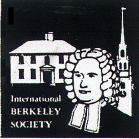History of the Society
by Ian C. Tipton, Raymond W. Houghton, and Maureen Lapan
revised by Stephen Daniel (2015) and Nancy Kendrick (2016)
 The International Berkeley Society was founded in 1975 to promote interest in the life and work of the philosopher Bishop George Berkeley. Its membership and leadership include not only scholars and philosophers from many countries, but also residents of the State of Rhode Island who are interested in the history and culture of colonial New England.
The International Berkeley Society was founded in 1975 to promote interest in the life and work of the philosopher Bishop George Berkeley. Its membership and leadership include not only scholars and philosophers from many countries, but also residents of the State of Rhode Island who are interested in the history and culture of colonial New England.
Berkeley resided in what is now Middletown, Rhode Island, from January 1729 to September 1731 and it was with the 250th anniversary of his arrival in mind that the Society was first formed, sponsoring quite ambitious preparatory gatherings in 1977 and 1978 and, in 1979, its first major international conference in Newport, Rhode Island. This hugely successful conference attracted many prominent scholars from numerous countries, and its proceedings were published in 1982 by the University of Minnesota Press (Colin Turbayne, ed.) as Berkeley: Critical and Interpretive Essays. In 1985 the Society sponsored a second major conference, again held in Newport but now celebrating the 300th anniversary of Berkeley’s birth, this with the welcome support of the Rhode Island Committee for the Humanities, the Whitehall (R.I.) Committee, the Irish American Cultural Committee, and Rhode Island College. This second conference was attended by more than fifty philosophers from various countries, and by a similar number of non-philosophers, most of them from Rhode Island. Once again, the proceedings were published, this time by the D. Reidel and as Essays on the Philosophy of George Berkeley (Ernest Sosa, ed.).
Because not all the members of the Society are philosophers, our conferences have always included special events addressed to the general public. The 1979 conference included a showing of “The Dean of Thin Air”, a film about Berkeley. (The original idea and script for the film were generated by the then President of the Society, Raymond W. Houghton.) In 1979, 1985, 1999, and 2008, events were scheduled throughout the Newport area in order to encourage the general public to attend. In 1992 the Rhode Island Committee for the Humanities, Rhode Island College, and the Rhode Island Philosophical Society funded a special general interest conference with such members in mind under the general title “Berkeley: The Old World and the New”. Papers delivered on that occasion presented a rounded picture of Berkeley and his times, the role of religion in early 18th-century New England, relations between the colonists and Native Americans, and the economic challenges facing England and its colonies. There was also a concert of eighteenth century music and an original performance by Rhode Island historian William Hutchinson as Berkeley. “Images of Berkeley”, a display of high-quality images shown previously at the National Gallery of Ireland, but never before seen in the United States, was also part of this conference.
The people of Rhode Island played a leading role in the formation of the Society and they continue to support it very actively. However, it must be stressed that the Society’s activities have by no means been restricted to Rhode Island. Our membership and leadership are international. In the forty years since the Society was founded, it has sponsored or co-sponsored scores of conferences around the world, including gatherings held in Dublin (1985 and 2014), Oxford (1985 and 1996), Iowa (1989), Paris (1996), Texas (2003), Estonia (2005), Helsinki (2007), Gaeta (2007), Neuchatel (2010), Zurich (2011), Longueuil (2012), and Krakow (2013).
The successive Presidents of the Society, Ray Houghton (Rhode Island College), Phillip Cummins (University of Iowa), Louis Alfonso (Rhode Island College), Ian Tipton (University of Wales Swansea), and Stephen Daniel (Texas A&M University) all played substantial roles in organizing conferences and in supporting numerous other events, including an afternoon session at an annual conference of Cheiron, the International Society for the History of Behavioural and Social Sciences, many meetings at the Eastern and Central Divisions of the American Philosophical Association, and a successful Summer School held in the delightful Barnabrow House Hotel in Midleton, Eire, close to Cloyne where Berkeley was Bishop. The Society continues to be very active, and in 2010 introduced a Young Scholars Award to help defray costs for recent Ph.D.s to attend conferences.
We invite you to become a member of the Society. In addition to the support provided for various conferences and other gatherings, our members receive an annual newsletter (Berkeley Briefs). Members may also visit the Berkeley Society Study Center, which is housed in one of the modern rooms at Whitehall, the home Berkeley built in 1729 in Middletown, Rhode Island. Whitehall, now a museum house, is owned and run by the National Society of the Colonial Dames in the State of Rhode Island and Providence Plantations and it has been open to the public since 1900. The visitors book at the house contains the names not just of the many members of the public who have visited it over the years, often out of casual curiosity, but also those of some of the leading scholars and philosophers of our time.
Anyone interested in Berkeley the man, the philosopher, the religious thinker, the economist, the mathematician, or the educational idealist is welcome to join the Society.
BISHOP GEORGE BERKELEY was born in Kilkenny, Ireland, on 12 March 1685. He made important contributions in the fields of philosophy, mathematics, and economics. He is especially famous as the author of the philosophical theory known as “immaterialism.” He died in Oxford, England, on 14 January 1753.
